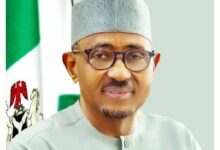Stable Policy Framework Required For Nigeria’s Energy Sector -NMDPRA

The Authority Chief Executive (ACE) of the Nigerian Midstream and Downstream Petroleum Regulatory Authority (NMDPRA), Engr Farouk Ahmed has said that the Nigeria’s ever changing energy landscape requires clear and stable policy frameworks, appropriate governance structures, secured and operating environment at all levels.
Engr. Ahmed added that the availability of in-country competencies, access to long-term affordable financing and purposeful leadership are other non-negotiables that are needed to move the Nigerian oil and gas sector forward.
Specifically, he insisted that these efforts must move in unison towards encouraging and promoting sustainable investment across the value chain and guarantee flexibilities and ease of doing business.
According to him, through the signing of the Petroleum Industry Act (PIA) on August 16th, 2021, the Nigerian government thus ushered in a new dawn in the history of the growth and prosperity of the Nigerian oil and gas industry.
He said: “The Petroleum Industry Act 2021 provides the legal and policy frameworks for improving governance and the competitiveness of the Nigerian oil industry to attract both local and international investors. The Act also provides for the removal of fuel subsidy and migration to full market-based pricing for petroleum products. The Act provided a clear regulatory framework that will promote the development of the appropriate market mechanism required to guarantee the efficient supply and distribution of petroleum products.”
Ahmed observed that the global energy landscape is undergoing an unprecedented period often beyond the familiar cyclic and seasonal trends experienced in the past.
He added that the COVID-19 pandemic dampened energy demand and afterwards, macro and microeconomic factors such as under-investment, tightening of monetary policies, high inflation, geopolitical tension, security issues that led to high and volatile energy prices, and erratic energy supply and demand.
These scenarios also led to energy poverty and security becoming a global concern, with countries developing measures and innovations to remain energy resilient.
“The year-on-year population growth in African economies coincides with a time when the continent faces significant headwinds as global and domestic shocks undermine progress toward restoring macroeconomic and social stability and sustaining economic recovery due to higher living costs stoked by rising inflationary pressures.
“Africa’s average real Gross Domestic Product (GDP) growth slowed to 3.8 per cent in 2022. The slowdown reflects the impacts of downside factors, including spillovers from rising geopolitical tensions, climate change risks, and the lingering impacts of the COVID-19 pandemic, which have been amplified by tightening global financial conditions and the associated increase in domestic debt service costs,” he stated.
Going memory lane, the NMDPRA chief stated that although the full deregulation of the oil and gas sector came into full effect on 29th May 2023 as part of the current administration’s bold commitment to implement the much-needed reforms, Nigeria has always flirted with the removal of subsidies for decades.
He explained: “Fuel subsidies have been in Nigeria since the 1970s when the government routinely sold petrol to Nigerians at below cost. This became institutionalized in 1977, following the promulgation of the Price Control Act which made it illegal for some products including Premium Motor Spirit (PMS) to be sold above the regulated price.
“PMS subsidy was initially financed through the Petroleum Support Fund (PSF) Scheme funded by the three tiers of Government. Under this regime, the Government determined the PMS subsidy amount based on import volumes, Landing cost of imported products and prevailing foreign exchange rate. The computed subsidy claim was directly remitted to the supplier to offset the pricing differential between the market-based price and approved regulated retail price of PMS.”
He further observed that while acknowledging the social benefits of PMS subsidy in Nigeria, the fiscal burden constituted a significant challenge for the government’s ability to fund national budgets over the years, adding, “the escalating burden was largely driven by an upward trajectory in global crude oil and products prices, freight rate and other associated cost on one hand and the year-on-year increase in average daily evacuation from depots on the other hand.”
He disclosed that the subsidy regime created a substantial regional differential in PMS retail pricing that incentivized cross-border smuggling.
According to him, the financial implication of PMS subsidy rose to over N400 billion monthly which translates to over N4.8 trillion or 6.27 billion USD (at an exchange rate of 766 NGN/1 USD).
Indeed, this severely impacted revenues available to all tiers of government as more than 20 per cent of the fiscal budget was expended on PMS subsidy thus leading to the inability of the government to meet its obligations.
He said: “The PMS subsidy effectively became a strain on the fiscal viability of the government and became a major obstacle to investment in the downstream petroleum sector. In the same vein, the perennial challenge of the fuel subsidy which has over the years encouraged inefficiency, waste and environmental pollution, has been a major bottleneck to aligning to Sustainable Development Goals (SDG).






